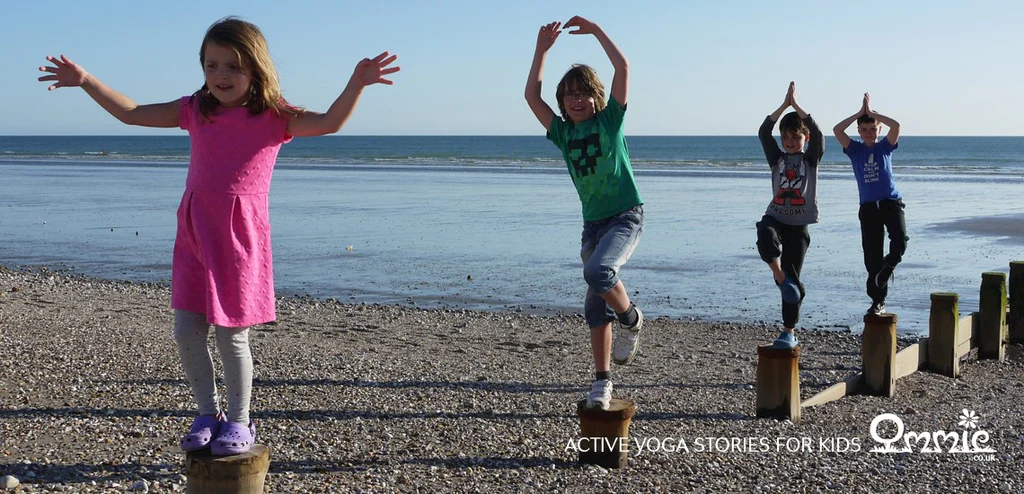Why yoga for kids? The science behind it.
Yoga integrates all aspects of ourselves – body, mind and spirit – and helps us find inner balance to improve our physical and emotional wellbeing. The pace of modern life is fast and not just for us adults but for our children too. Although they are just a few years old, children also feel all kinds of pressures already, whether personal, parental or social, to keep up with everyone and everything around them.
My hope is that by engaging children through the combination of stories and the simple practice of yoga, whenever and wherever, it will help to enhance concentration, body awareness and co-ordination – and of course, be fun! After doing more research on Kids Yoga, I was impressed to learn that it is proven to improve self-esteem, physical health and grade point averages among children1 and not just that, but Yoga can help to resolve sleep issues and even bring about positive changes in children with autism and ADHD amongst a whole host of other benefits2. (1Marsha Wenig, creator of the Gaiam YogaKids® DVD programs and president of YogaKids International.) 2(Kristie Patten Koenig, Ph.D., an associate professor of occupational therapy at New York University)
Positive effects of meditation and yoga on the brain
Recent news3 about the positive effects of meditation and yoga shows differences in brain images of those who to meditate and do yoga and those who don’t. Improvements in cognition and emotional well-being associated with meditation and yoga have been detected (3http://science.sciencemag.org October 27, 2017). What fabulous news! Not that we really needed the proof, as we know the immediate benefit of that wonderful, fuzzy, happy feeling of lightness after having done a yoga practice, nevertheless, it is great to know that science is catching up to ‘validate’ our yoga experience.
And there is more, at a 28 September 2017 Neuroscience & Society event neuroscientist Sara Lazar said that not only were the brain images in a study of people who meditated different from those who did not, other research showed that certain changes in performance such as improved scores on the Graduate Record Exam occurred in controlled experiments involving mindfulness training. “This suggests neuroplasticity to me,” said Lazar, associate researcher in the psychiatry department at Massachusetts General Hospital and an assistant professor in psychology at Harvard Medical School, “the ability of your brain to change, to grow and adapt” in correlation with meditation.
A change in brain chemistry associated with yoga
Chris Streeter, associate professor of psychology and neurology at Boston University School of Medicine, reported that the brain chemical GABA, a neurotransmitter associated with control of anxiety, peaked in experienced yoga practitioners after they executed 60 minutes of postures. “That was the first time people could say there was a change in brain chemistry associated with yoga,” Streeter said. In order to test whether yoga improved mood and lessened anxiety more than other physical exercise, study subjects were tested before and after a 12-week intervention in which they did yoga or walked. The activities were metabolically matched to involve the same amount of physical exercise. The yoga group consistently felt better, according to various markers of mood and anxiety, Streeter said. An hour after the yoga, acute changes—revitalization, tranquillity, positivity, and increases in GABA levels—were reported. In depressed patients, even those already on antidepressants, yoga was associated with improved sleep, increased positivity, and decreased suicidal ideation4. (4http://science.sciencemag.org October 27, 2017).
As the Department of Education is raising achievement targets, the pressure on teachers filters down to the children. Teachers have less time to encourage creative thinking and to instill confidence in the children, as the school day becomes more about achieving targets. Yoga is the perfect antidote to this intensified learning environment, and more and more schools are now adopting mindfulness programmes for kids.
Yoga effectiveness in schools
NPR (National Public Radio US) has reported that researchers surveyed teachers at a Bronx public school that had a daily yoga program and found that the program reduced kids’ aggressive behavior, social withdrawal, and hyperactivity, compared with a control group of kids with autism who did not practice yoga. Kristie Patten Koenig, Ph.D., an associate professor of occupational therapy at New York University who led the study, says that yoga was effective because it seemed to play to the strengths of kids with autism while also reducing stress. Autism Key, an autism support website, says that yoga helps address kids’ heightened anxiety, poor motor coordination, and weak self-regulation, something that otherwise is very difficult to do. (http://www.npr.org/sections/health-shots/2012/10/12/162782583/classroom-yoga-helps-improve-behavior-of-kids-with-autism)
We parents may notice how yoga benefits our kids, but of course, the best judges are the kids themselves. The feedback I am receiving from the kids after yoga is that they feel happy, strong and calm. And parents say, that their kids are better ’balanced’ and more focused on their tasks – what is there not to like?
